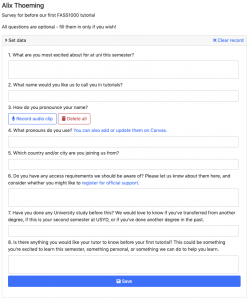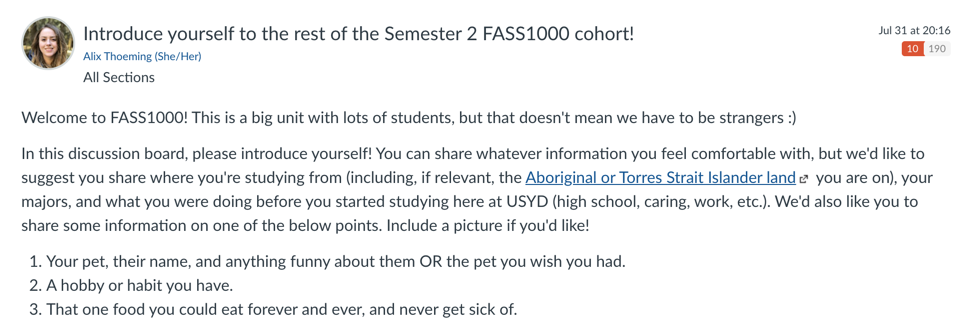2021 brought with it further challenges to teaching and new opportunities to reflect and learn. Centred on the Faculty of Arts and Social Sciences (FASS) pedagogical values, Online by Our Design (ObOD) provides a platform for teaching and education support staff to access and engage in shared teaching and learning resources. At the heart of the ObOD approach lies communication.
In this article, Leanne Stevenson from FASS Education Innovation and Design speaks with Dr Alix Thoeming about the value of communication, how they design communication into large units of study, the tools available to help and the advantages of online communication. Alix is undergraduate alumni, with a PhD in Theoretical Archaeology, an Educational Designer in Educational Innovation, and the co-coordinator for FASS1000, the new foundational core unit for Bachelor of Arts 2021.
Leanne Stevenson: To get us started, can you tell us briefly about the new FASS1000?
Alix Thoeming: FASS1000 is the new foundational core unit for the Bachelor of Arts (BA), running for the first time in 2021. It is one of the largest units in the faculty, with a cohort of over 1350 students, new to higher education.

Leanne: How do you build communication into FASS1000? How is this managed at scale, from the individual student to the entire cohort?
Alix: FASS1000 is a large unit, but we try to make communication as personalised and friendly as possible. We start the semester by asking students to complete a short survey that includes questions about motivations for enrolling in a BA, what students are most excited about for the year, students’ access requirements, their pronouns, the city they’re in, and how we should address them in tutorials (including a section to record their name pronunciation!).
We used the Student Relationship Engagement System (SRES) for this as it allowed us to send this information through to tutors in their weekly rolls and identify students who might need extra support (like a referral to Disability Services, for example), but it could also be done using any survey system or even a practice Canvas quiz. We also used SRES to send every student an individual welcome email from myself and Carolyn Stott, the unit coordinators, which includes the name of their tutor and general important information about the first few weeks of semester.
In the first few weeks of semester, we also hosted a ‘getting to know you’ Canvas discussion board where we asked students to respond to some fun and easy prompts that would help us start building community. Our students started responding to each other quickly, sharing a love for cats and dogs, and tips about movies and hotpot restaurants! Our fantastic postgraduate teaching fellows Anastasiya Byesyedina and Tara Smith supported us in responding to every student who posted with a brief friendly comment, which really helped build a bit of community early on.
From then on, we really wanted students to make the most of the space that’s most ‘theirs’ in the unit – their tutorials. The tutorial team in FASS1000 is made up of dedicated and experienced tutors, and we wanted to both give them everything they needed to run classes each week but also a good deal of freedom in how they did that, so we communicated that as much and as strongly as possible – a clear message of ‘here are the goals of the unit, we trust you with them, make the students feel at home’.
We try to make the most of the data available to us in Canvas – simple things like using the ‘message students who’ function from the Gradebook the day after an assessment is due to capture students who missed applying for a simple extension and may need to know how to apply for special consideration (many first years do not even know it exists, or are worried about reputational damage if they apply). SRES offers even more options for personalisation using that data and we used it to do things like reaching out via email to students who were lagging in terms of Canvas activity or tutorial attendance, sending assessment feedback directly to inboxes, or checking in on how they were feeling about their progress after tutorials.
Truly the best tip I can give is to consult your amazing FASS Educational Designers for realistic and sustainable communication and engagement strategies…
A simple extension form set up using SRES was also designed to break down the sometimes intimidating ‘emailing the unit coordinator’ barrier, and handily minimise my workload in (not) replying to hundreds of emails. Truly the best tip I can give is to consult your amazing FASS Educational Designers for realistic and sustainable communication and engagement strategies (I’ve learned a huge amount from them), and to think about heading along to an SRES training session – they run at the beginning of each semester.

Leanne: Finding the sweet spot between enough and too much communication is the difference between clear understanding and information overload, both for students and teaching teams. What insights can you share as coordinator, what have been the challenges of only having online platforms and what have you learned about online communication?
Alix: I agree with this statement – you do not want to overload the students but there is a lot of important information that they need to digest and have access to! A key part of doing this well is consistency, and I write myself a little ‘communications strategy’ at the beginning of each semester. I send a Canvas announcement at 9 am every Monday morning including information about the week’s content; what they should expect from each pre-recorded lecture, lecture, podcast, and tutorial. It also includes ‘housekeeping’ reminders about things like upcoming assessments, key dates, simple extension protocol, etc. I think of this as my students’ weekly plan; if they read nothing else, this should be enough. We tried to send out other announcements as sparingly as possible to not muddy these waters and have the students switch off or, even worse, switch their email notifications off(!!). I also set myself reminders to contact students around census dates, assessment due dates, and anything else important that is happening in the unit.
While it may seem like I use SRES to contact the students a lot there is a clear divide; announcements for information that the entire cohort needs, SRES for personalised or individualised information. We also made it a priority to build out the Canvas site with lots of readily accessible information; an Introduction module hosts among other things a page about what our weekly tasks are, a page on health and wellbeing, a link to our FAQ (Frequently Asked Questions) discussion board and contact information for tutors.
The teaching team also has access to a locked, unpublished module where we maintain a tutor manual, links to the FASS ‘specialist advice and support for students’ guide for staff, marking information, and a page that’s updated each week with tutorial overviews, roll links and suggested tutorial plans. We also use a Teams channel to stay in touch and share ideas about each week.
To be honest I much prefer online-only platforms for communication, as I feel like they make things a bit more egalitarian. Students may miss lectures or tutorials for a whole bunch of reasons, much more commonly work or caring responsibilities than a lack of motivation and having all the important stuff on Canvas in a consistent location means it can be found when it is needed.
Want to know more?
- Check out the Online by Our Design site to find out more about the innovative teaching practices in FASS
- Find out more about SRES or sign up for an SRES workshop
- Contact the FASS Educational Design team: [email protected]






No Comments